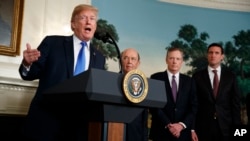U.S. President Donald Trump signed a presidential memorandum on Thursday, initiating actions to consider imposing tariffs on a long list of nearly 1,300 Chinese imported products worth about $60 billion.
The move could limit China’s ability to invest in the U.S. technology industry, setting the stage for a possible trade war with Beijing.
The decision to take action is a result of an investigation conducted by the U.S. Trade Representative to determine whether Beijing’s trade practices may be “unreasonable or discriminatory” and that may be “harming American intellectual property rights, innovation or technology development.” After a seven-month investigation, the USTR found the policies were in violation.
At the signing ceremony, Trump said, “We have a tremendous intellectual property theft going on.”
He said the U.S. wants reciprocal trade and tariff deals with China and other countries.
“If they charge us, we charge them the same thing,” Trump said at the White House ceremony.
He also blamed the “unfair Chinese trade practices” for the U.S. trade deficit with China, which has reached a record $375 billion on his watch.
WATCH: Fearing Trade War, Some US Farmers Worry About Trump China Tariffs
China’s response
China’s Commerce Ministry on Friday proposed a list of 128 U.S. products as potential retaliation targets, according to a statement on its website.
It plans a 25 percent tariff on U.S. pork imports and 15 percent tariffs on American steel pipes, fruit and wine, the statement said.It also plans to take legal action against the U.S. under the World Trade Organization framework.
The statement did not go into greater detail.
U.S. agricultural products, particularly soybeans, have been flagged as the biggest area of potential retaliation by Beijing. The Commerce Ministry said China last year bought about $3 billion worth of the goods affected by the higher tariffs.
China urged the U.S. to resolve the trade dispute via dialogue.
Asian stock markets took a dive on the news, with Japan’s Nikkei index sliding as much as 3 percent in early Friday trade.
Campaign promises
Trump campaigned on promises to bring down America’s massive trade deficit — $566 billion last year — by rewriting trade agreements and cracking down on what he called abusive commercial practices by U.S. trading partners.
The investigation concluded that China “uses foreign ownership restrictions, including joint venture requirements, equity limitations, and other investment restrictions, to require or pressure technology transfer from U.S. companies to Chinese entities.”
Trade associations representing a wide range of the business community said they largely agree with criticism of China’s intellectual property practices, but criticized the tariffs as a poor remedy that could ultimately harm U.S. businesses and raise prices for consumers.
Earlier this week, some of the largest American retailers and tech companies, including Walmart and Apple, urged Trump to carefully consider the impact the tariffs would have on consumer prices.
“As you continue to investigate harmful technology and intellectual property practices, we ask that any remedy carefully consider the impact on consumer prices,” a coalition of more than 40 business groups, led by the Information Technology Industry Council, said Sunday in a letter to the president.
“As the industry closest to consumers, retailers know firsthand how high tariffs will hurt American families,” the letter continued.
The prospect of a trade war sent markets plummeting, with the Dow Jones Industrial Average down 724 points, almost 3 percent, its biggest drop in six weeks.
Global trade conflagration
Bloomberg Economics estimates a global trade conflagration could wipe $470 billion off the world economy by 2020.
The Trump administration has said it is simply taking long-overdue action following years of unfair Chinese trading practices that they argue previous administrations have insufficiently countered.
Peter Navarro, Trump’s hawkish top trade adviser, said the administration had decided on the tariffs in lockstep and said the U.S. opted to take tariff actions after dialogues with China over the past 15 years have failed to produce significant changes in Chinese behavior.
Thetariffs will be subject to a 15-day comment period before the U.S. Trade Representative finalizes the move. Other measures, including new restrictions on Chinese investment in the U.S., will take longer.








